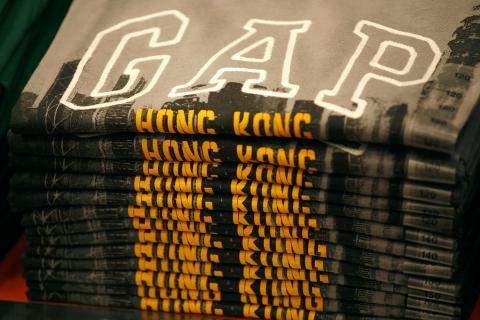Gap Inc, the biggest US apparel chain, expects the share of revenue from online and overseas sales to rise by half in about two years, as it expands in countries, including China, to reduce reliance on its home market.
“China is probably the cornerstone of our expansion,” Redmond Yeung (楊得銘), president of China operations, said in an interview in Hong Kong yesterday.
Overseas stores and Gap’s online business will account for 30 percent of total sales by the 12 months ending Jan. 31, 2014, rising from 20 percent last fiscal year, he said.

Photo: Reuters
Gap is seeking to tap rising Chinese affluence as consumer confidence in the US stagnates around recession levels.
Consumers in China, the world’s most populous nation, will spend more on clothes as the number of households with at least 74,000 yuan (US$11,600) in annual income surges to 140 million by 2020 from 50 million last year, Boston Consulting Group said in July.
China “is where retail sales are growing fast,” Yeung said.
“This is the right time to capture the growing affluence of China’s middle class,” he said.
Gap sells clothing under its namesake and the Banana Republic and Old Navy labels.
The San Francisco-based company currently only offers apparel under the Gap label in Greater China, a region that typically includes China, Hong Kong and Taiwan.
Gap opened its first store in Hong Kong yesterday and plans to increase the number of outlets in Greater China fivefold to 45 by January 2013 from the current nine.
Stores in the cities of Hangzhou and Tianjin would open in the coming weeks, adding to those in Beijing and Shanghai, it said.
“Gap is not cheap, but Chinese consumers are having a greater appetite to spend,” Yeung said.
“We want to first introduce our iconic Gap brand to Chinese consumers and build on that,” he added.
Gap plans to open the first Old Navy outlet in Asia next year in Japan, Yeung said.
The company, whose competitors include Ponzano, Italy-based Benetton Group SpA and Hennes & Mauritz AB of Stockholm, already has 150 Gap and Banana Republic stores in Japan, the world’s third-biggest economy.

With an approval rating of just two percent, Peruvian President Dina Boluarte might be the world’s most unpopular leader, according to pollsters. Protests greeted her rise to power 29 months ago, and have marked her entire term — joined by assorted scandals, investigations, controversies and a surge in gang violence. The 63-year-old is the target of a dozen probes, including for her alleged failure to declare gifts of luxury jewels and watches, a scandal inevitably dubbed “Rolexgate.” She is also under the microscope for a two-week undeclared absence for nose surgery — which she insists was medical, not cosmetic — and is

CAUTIOUS RECOVERY: While the manufacturing sector returned to growth amid the US-China trade truce, firms remain wary as uncertainty clouds the outlook, the CIER said The local manufacturing sector returned to expansion last month, as the official purchasing managers’ index (PMI) rose 2.1 points to 51.0, driven by a temporary easing in US-China trade tensions, the Chung-Hua Institution for Economic Research (CIER, 中華經濟研究院) said yesterday. The PMI gauges the health of the manufacturing industry, with readings above 50 indicating expansion and those below 50 signaling contraction. “Firms are not as pessimistic as they were in April, but they remain far from optimistic,” CIER president Lien Hsien-ming (連賢明) said at a news conference. The full impact of US tariff decisions is unlikely to become clear until later this month

GROWING CONCERN: Some senior Trump administration officials opposed the UAE expansion over fears that another TSMC project could jeopardize its US investment Taiwan Semiconductor Manufacturing Co (TSMC, 台積電) is evaluating building an advanced production facility in the United Arab Emirates (UAE) and has discussed the possibility with officials in US President Donald Trump’s administration, people familiar with the matter said, in a potentially major bet on the Middle East that would only come to fruition with Washington’s approval. The company has had multiple meetings in the past few months with US Special Envoy to the Middle East Steve Witkoff and officials from MGX, an influential investment vehicle overseen by the UAE president’s brother, the people said. The conversations are a continuation of talks that

CHIP DUTIES: TSMC said it voiced its concerns to Washington about tariffs, telling the US commerce department that it wants ‘fair treatment’ to protect its competitiveness Taiwan Semiconductor Manufacturing Co (TSMC, 台積電) yesterday reiterated robust business prospects for this year as strong artificial intelligence (AI) chip demand from Nvidia Corp and other customers would absorb the impacts of US tariffs. “The impact of tariffs would be indirect, as the custom tax is the importers’ responsibility, not the exporters,” TSMC chairman and chief executive officer C.C. Wei (魏哲家) said at the chipmaker’s annual shareholders’ meeting in Hsinchu City. TSMC’s business could be affected if people become reluctant to buy electronics due to inflated prices, Wei said. In addition, the chipmaker has voiced its concern to the US Department of Commerce